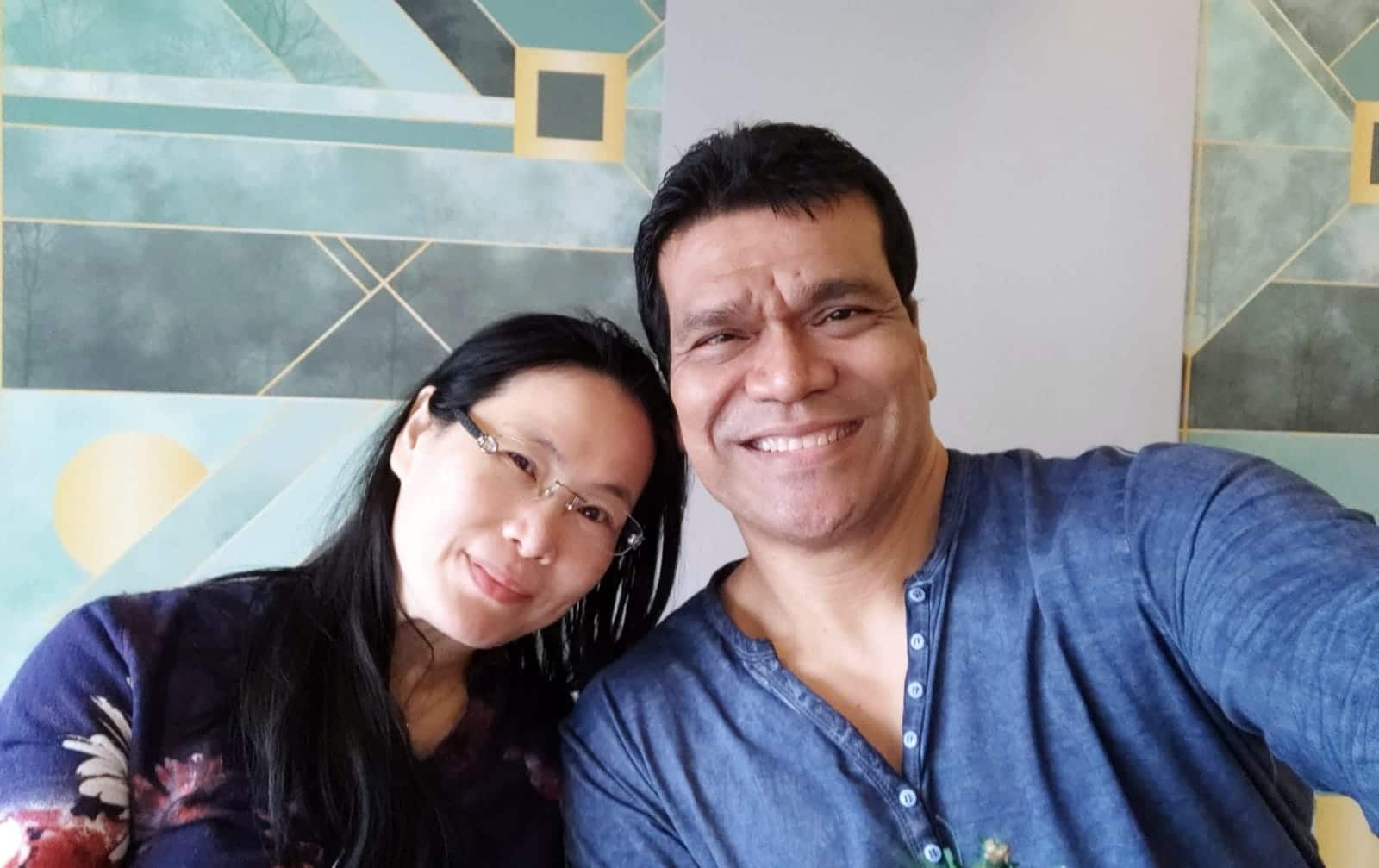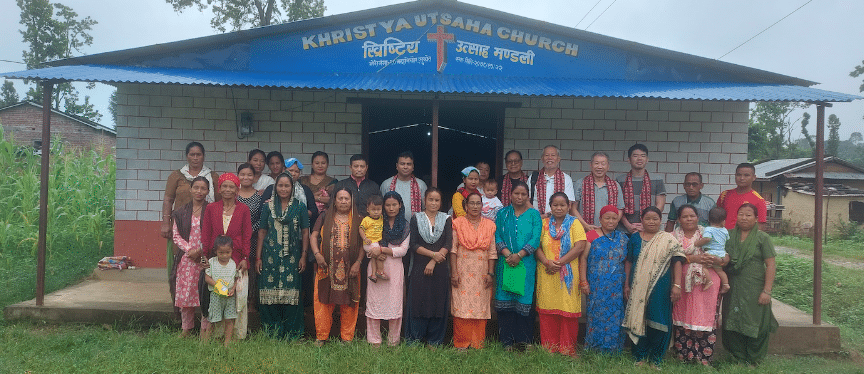A drink packet broke the heart of Singapore couple who moved to Cambodia to serve slum dwellers
by Janice Tai // January 5, 2022, 6:01 pm
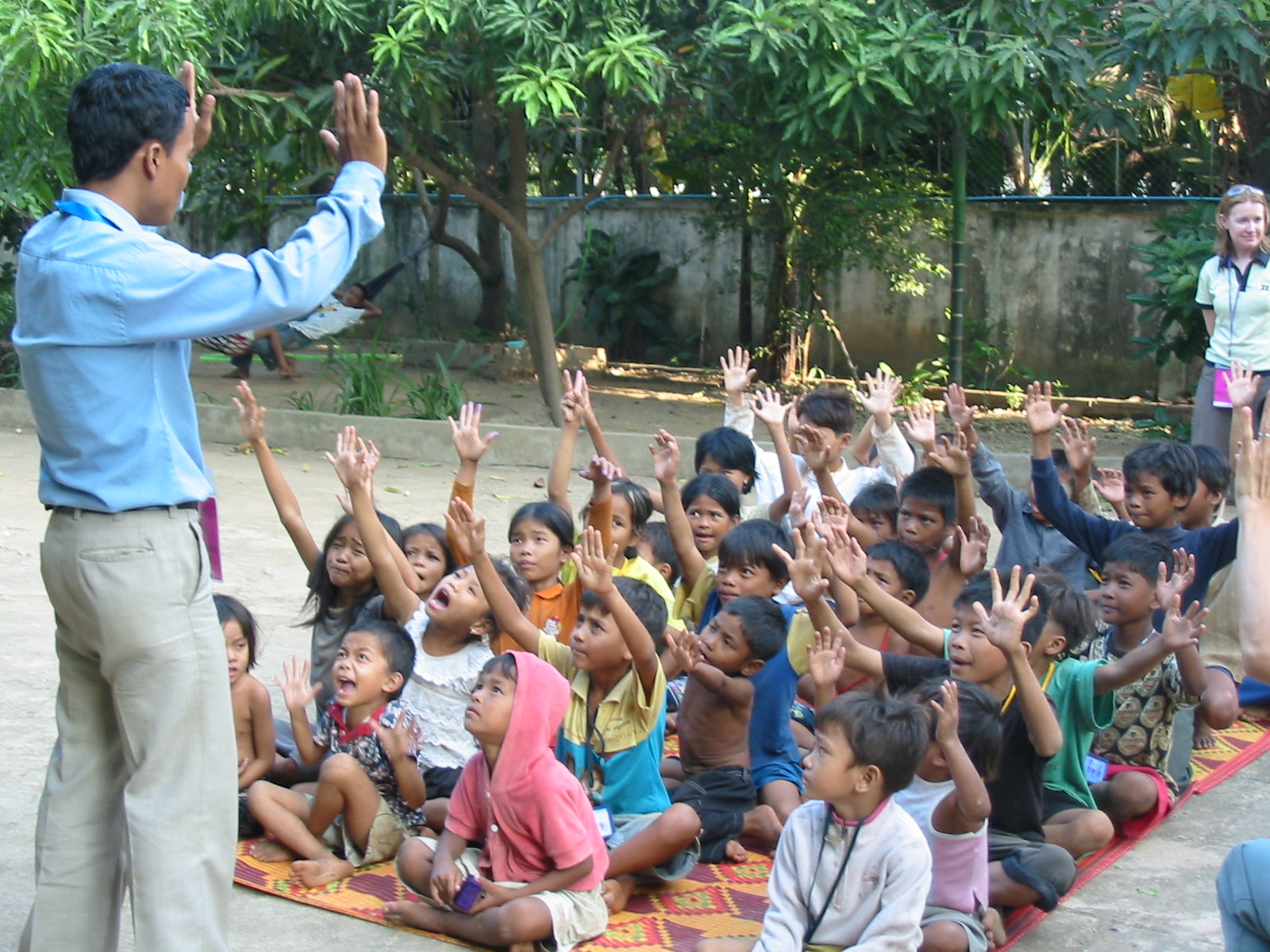
Children from a slum community in Cambodia attending an outreach programme led by a local MTI staff. All photos courtesy of OM Singapore.
A year after social workers Elijah Sim and Grace Loh got married in 2001, the newlyweds embarked on the radical journey of discerning God’s plans for them to serve in the slums in Cambodia instead of settling comfortably into a routine of marital bliss in their new home.
It was meant to be an exploratory trip to see how they can play a part in supporting the vulnerable and the poor there. The couple had gone to the GoForth National Missions Conference that year and had heard of the needs of the country from staff of Operation Mobilisation’s (OM) Mercy Teams International who were manning a booth at the conference.
Shortly after, Elijah had also read a book titled entitled Killing Fields Living Fields: Faith in Cambodia that documented a spiritual awakening happening in the country amid its history of genocide and civil war. His spirit was stirred.

As newlyweds, Grace and Elijah found their hearts stirred for the slum dwellers in Cambodia after attending a GoForth Conference.
During their exploratory trip to Cambodia, they recalled being confronted with the distinct sights and sounds of the children out in the streets.
Said Grace, now 47: “When you walk around in Cambodia, you see barefoot children on the streets. They are not in school but collecting trash to recycle to support their families. Older siblings bring younger ones out to work. It is heartbreaking to see such a sight.”
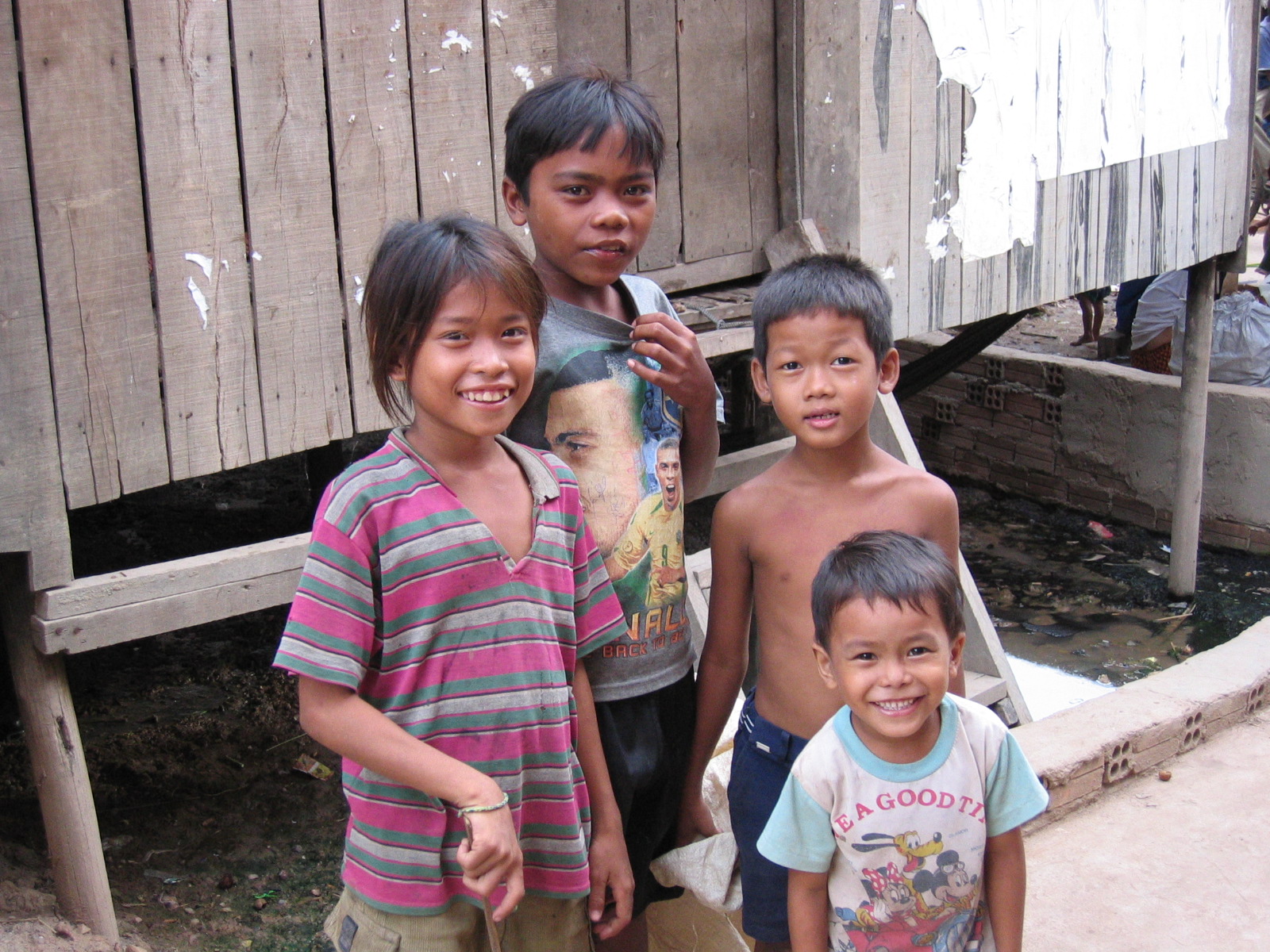
Children from the community that Grace and Elijah served.
Elijah was also overwhelmed.
“We were carrying food and drinks to distribute to the urban poor and the kids came in all directions, crowding around us. I began thinking: ‘What can a packet of drink do?’ I know such extreme poverty would expose them to the danger of vices and being exploited.”
The couple returned to Singapore with a burden for the people of Cambodia. From her younger days, Grace has always had a heart for missions, being involved in missions as part of her campus ministry. She also served in the OM’s ship, MV Doulos, after she graduated from school. Elijah had also gone for some short-term mission trips.
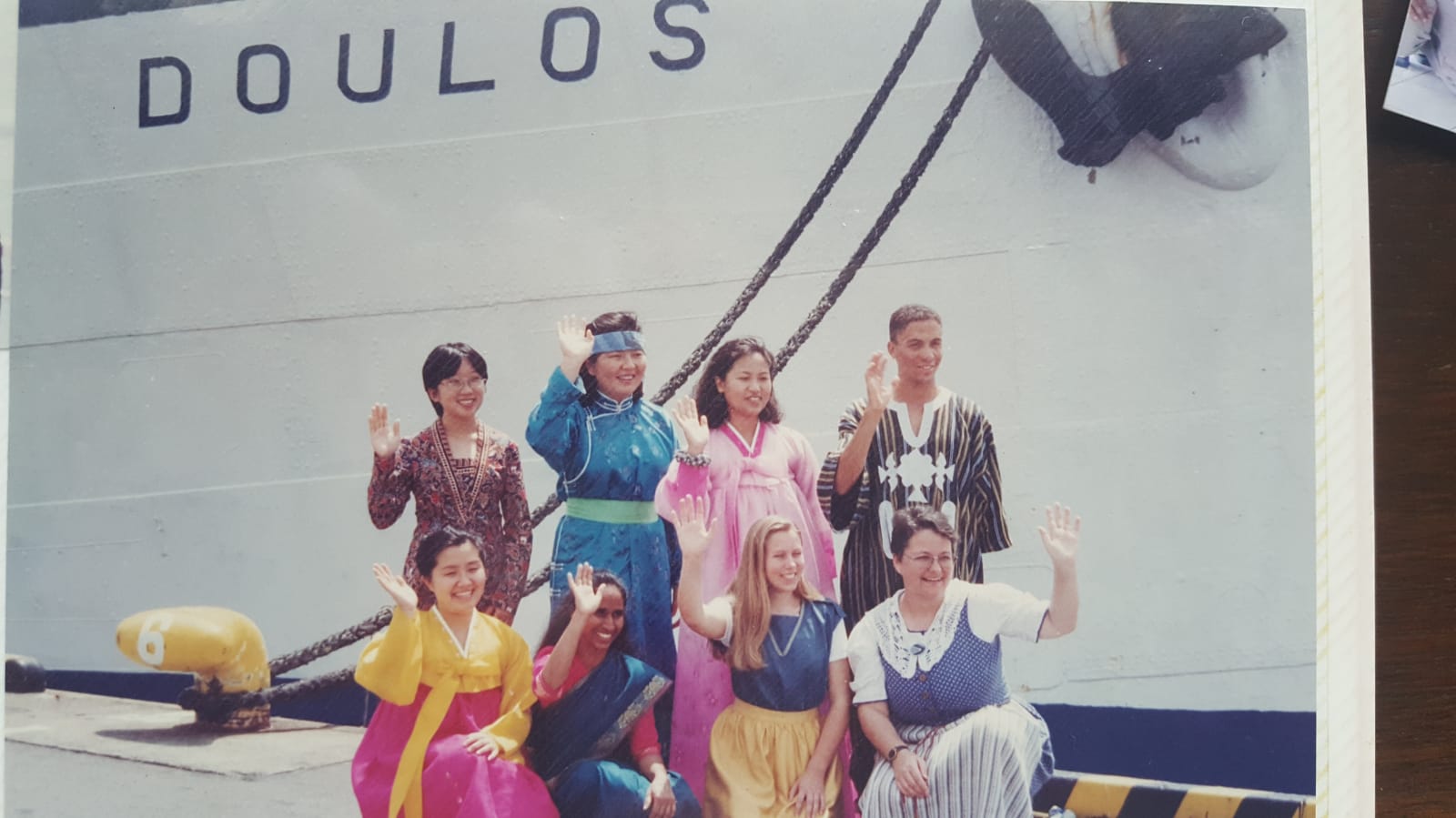
Grace (standing, extreme left) on the OM ship, Doulos, in 1996.
However, the pair knew that moving into missions full-time would be a big step. By then, they were fairly established in their careers as social workers; they knew that relocating overseas would require much adjustment.
“What can a packet of drink do? I know such extreme poverty would expose them to the danger of vices and being exploited.”
In seeking reassurance from God over the decision of whether to head to Cambodia to be missionaries, Elijah asked God to show him a sign for confirmation.
Just as Paul had a vision during the night of a man of Macedonia standing and begging him, “Come over to Macedonia and help us”, Elijah also received a dream from God one night.
“I dreamt of two tanned-looking men speaking in a language I could not understand. Yet I could sense that they were asking me to come over. That dream sealed it for me,” said Elijah, now 52.
Elijah quit his job of 10 years as a social worker at Pasir Ris Family Service Centre, where he had first gotten to know Grace as a colleague. On a similar path, Grace had worked at Pasir Ris and Tampines Family Service Centres for seven years by then. On March 27, 2004, they left for Cambodia to do mission work.
Plowing new ground
In Cambodia, Elijah and Grace had their work cut out for them as the country was then emerging from decades of political turmoil. There was also widespread poverty, oppression and exploitation.
In many urban and rural slums, prospects of the residents seemed bleak, with safety and the family unit under threat.
Elijah and Grace tapped on their social work expertise and pioneered a new ministry, Project Freedom.
As its name suggests, Project Freedom works to bring freedom to children, women and families caught in the cycle of poverty and oppression.
The team works among people living in slums in Chbar Ampou, a district in the city of Phnom Penh. Poverty, gang-related activities, family trauma and drug abuse, trafficking and other social and economic problems are rife in these slums.
Social workers in the team minister and support the locals there by offering counselling services and training programmes, as well as raise public awareness on topics such as abuse and domestic violence.
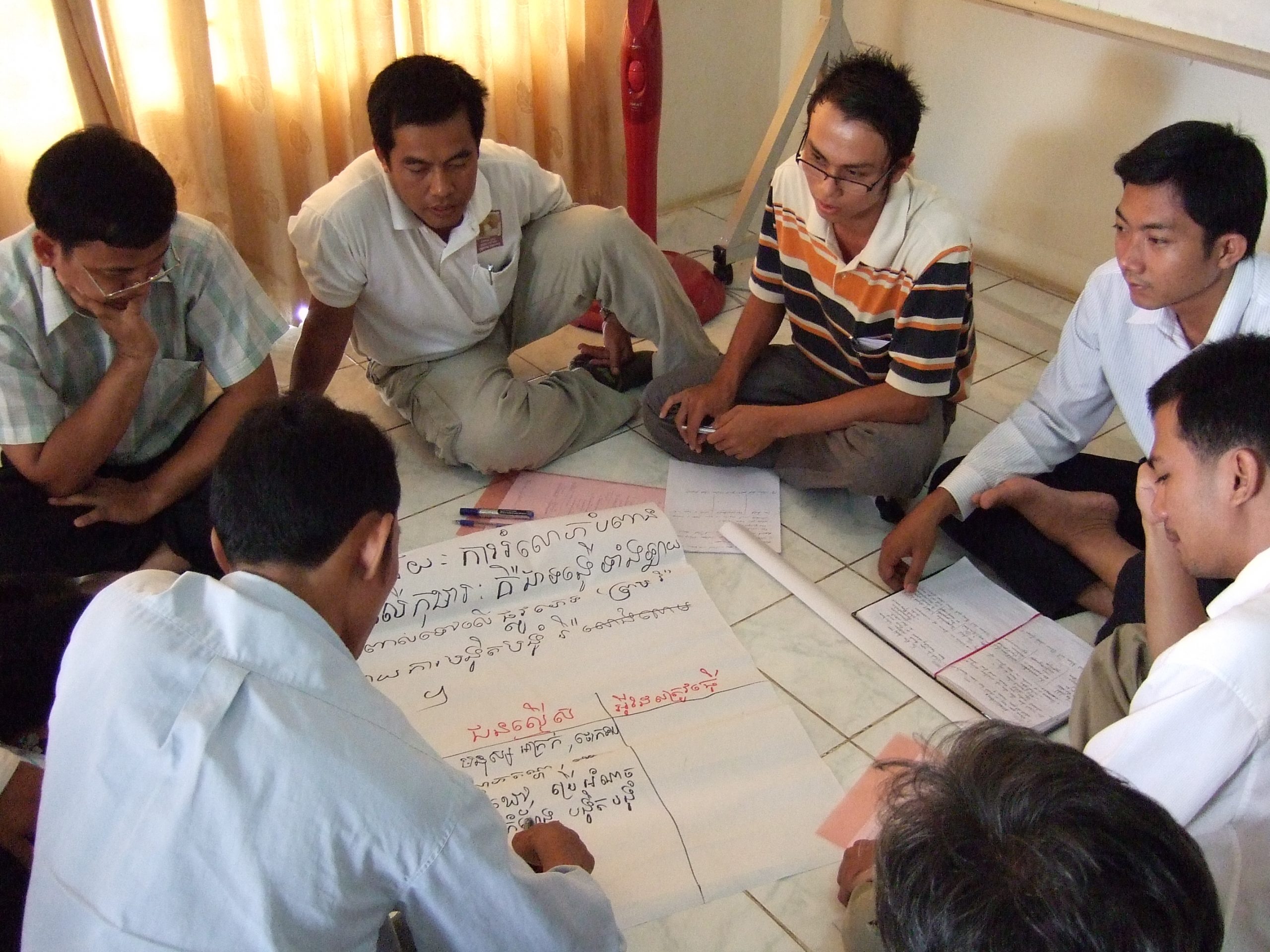
A group discussion at a community awareness workshop on child abuse, with participants from local governing authorities and NGOs.
The team would venture into schools and churches and conduct karaoke activities with the children. Song lyrics addressed the difficulties of peer pressure, drugs, abuse and domestic violence.
Counselling and other intervention programmes are offered to not only their own clients but also open to clients of other social service agencies. Training programmes to empower the local people in social work are open to not only their own staff, but also workers from various Non-Governmental Organisations (NGOs).
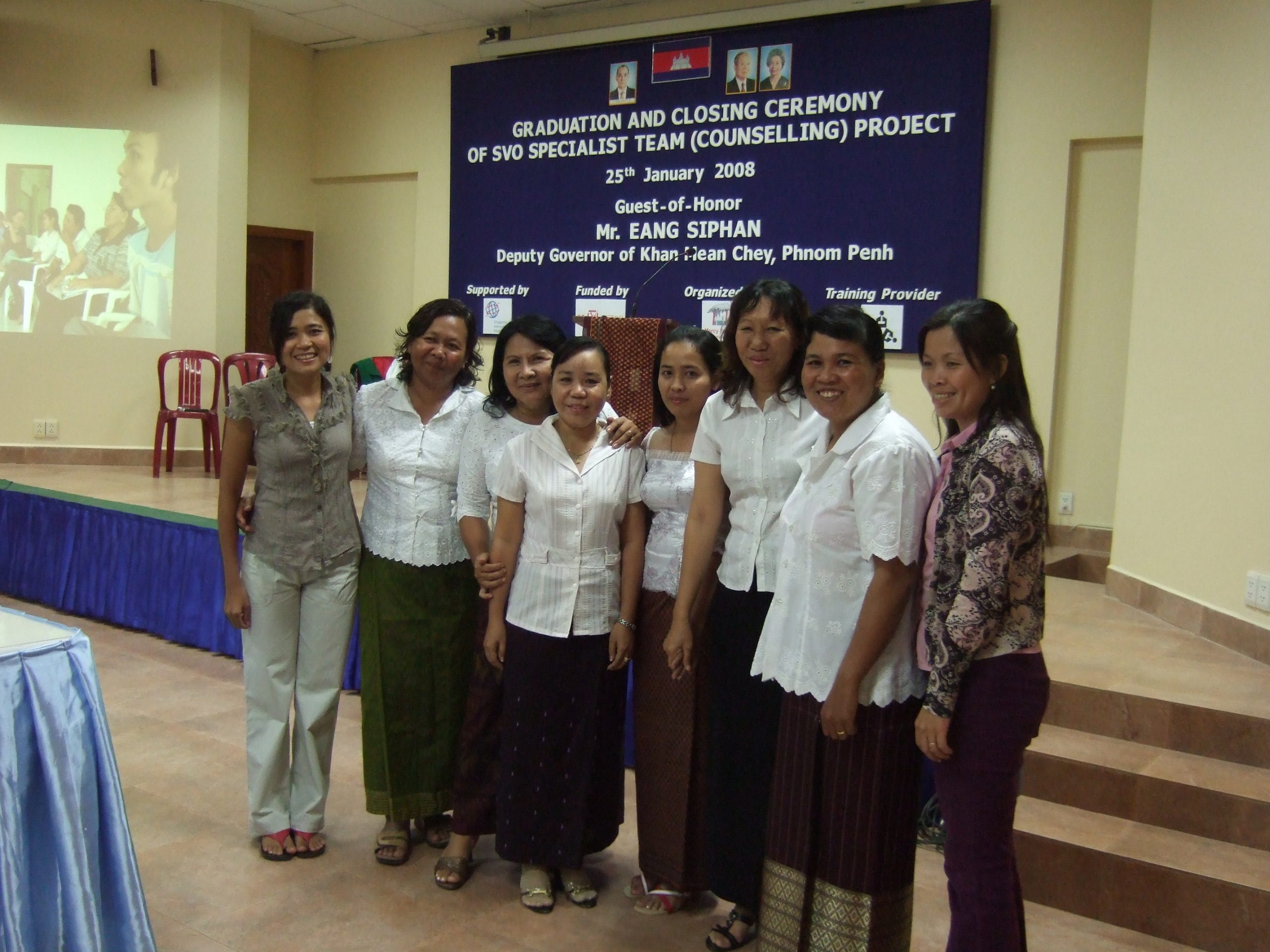
An MTI staff member (second from left) with social workers from different NGOs who were graduating from the MTI counselling training programme.
“At that time, their local universities did not have a social work degree programme, so the people needed the knowledge and skills,” said Elijah.
Fatherlessness and abuse
Elijah and Grace were team leaders to an international team of staff hailing from various parts of the world such as Australia, Britain, Europe, Asia, and United States. They ran group work sessions for at-risk youth, children and parenting programmes as well as trained NGO workers. Although they spoke some Khmer, they received translation help from their local colleagues.
“A generation of fatherless children often grows up not knowing how to parent or how to cope with stress and anger.”
At the time, domestic violence was common in families, whether between spouses or their children. The father figure was often absent.
“We found that the father would often not be around and may either be in prison, drunk, gambling or taking drugs. Sometimes he would leave the family and have another family outside. Or both parents may not be around and the children are left with their grandparents,” said Elijah.
“This fatherlessness result in their children having an orphan spirit, where they feel uncertain about their future and do not feel a sense of belonging. Violence begets violence and a generation of fatherless children often grows up not knowing how to parent or how to cope with stress and anger,” he added.
One challenge the team faced was meeting the locals’ physical needs of shelter, food and medical aid before being able to reach out with psychosocial support.
“We wanted to provide them with practical help but also not breed dependency. It was something we learnt to negotiate,” said Elijah.
“We found that our local staff also needed to be discipled and we needed to see them as part of our ministry.”
Added Grace: “There were so many needs around and we had to prioritise, or else it’s easy to be overwhelmed. Sometimes, the challenge is in feeling so small and wondering how much impact we can make, but then we re-orientate to look at each life that we can touch and to take things one step at a time.”
The Cambodian people live in the shadow of the trauma of war. Grace said they have many Cambodian colleagues who have lost their fathers during the Pol Pot regime or spent time in refugee camps in Thailand.
“The trauma of war may become abuse or violence at home if the fathers don’t not know how to function as fathers and handle their anger outbursts, for example,” said Elijah.
“So we found that our local staff also needed to be discipled and we needed to see them as part of our ministry,” he added.
To cope with the intensity of work there, husband and wife took breaks by taking long bus trips of four to five hours to the beach or to another province for short getaways.
On Sundays, Elijah would also, on his own initiative, rent a tuk-tuk (local taxi) for some 10 to 15 children, who would clamber into the vehicle to visit an Anglican church that was started by Singaporeans years ago.
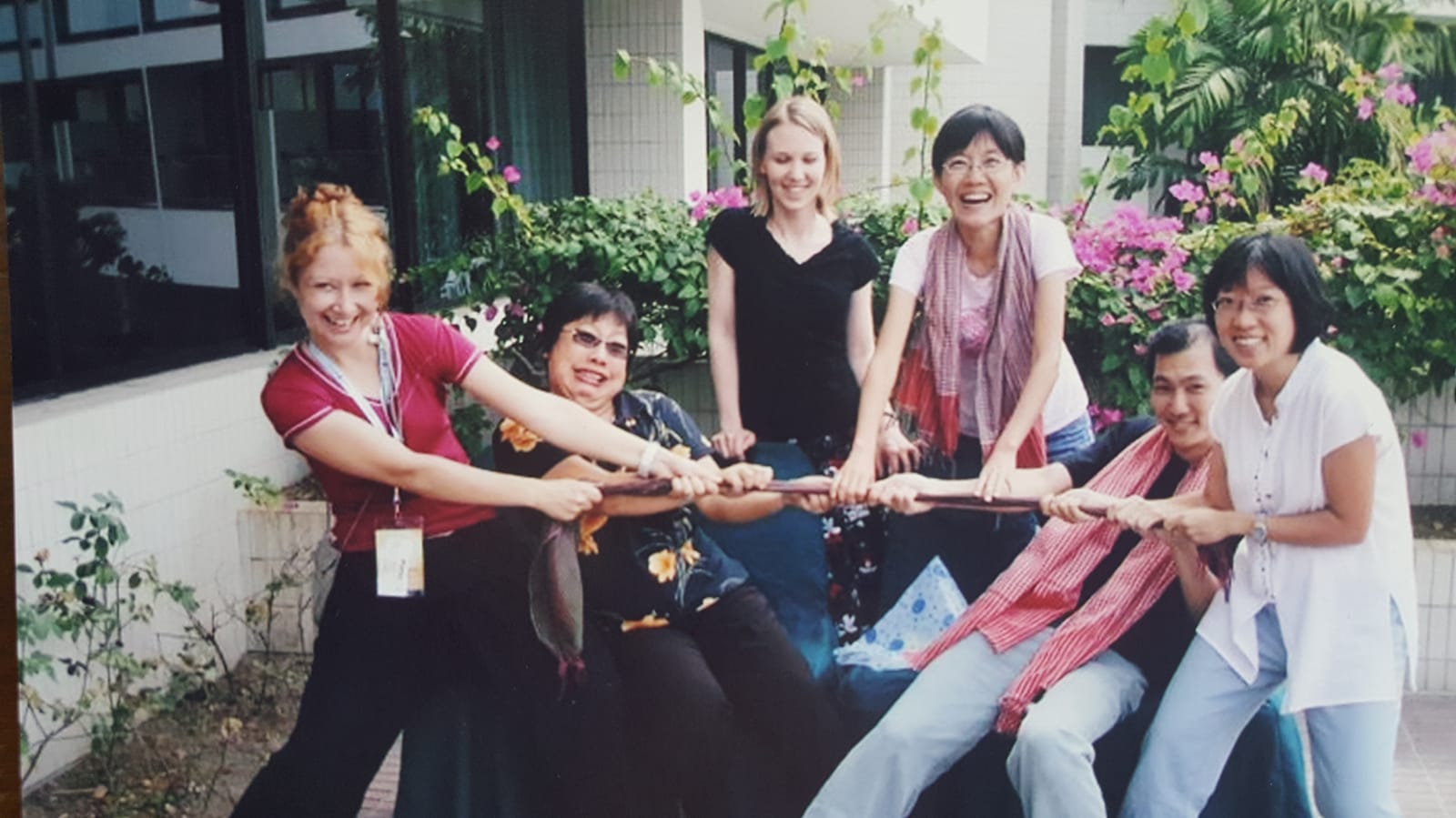
The MTI Cambodia missionary team during one of MTI’s international retreats.
“That was very memorable for me, that my work with them was not purely professional but that the Gospel could be shared with them. I hope seeds were planted.”
God At Work
The couple has witnessed God working in the lives of their local counterparts. One of their colleagues at Project Freedom was herself once trafficked, though she managed to escape from her captors.
“Our worldview needs to be larger – beyond Singapore. My life cannot just be limited to my family and church in Singapore.”
“She lived in the slums and joined us as a staff after finishing school,” said Elijah. “She has worked with us for 15 years and is now a leader, serving her own people. She has grown so much and her life has been transformed.”
God has also shown up in a timely way for the children.
Grace remembered a time when Singaporeans donated over 1,000 gift boxes filled with stationery and toilettries as Christmas presents to the children in churches and other organisations in Cambodia. When the boxes reached Cambodia, the customs refused to release the boxes unless certain “taxes” were paid.
“We didn’t want to give a bribe so the boxes were stuck there and Christmas was approaching. Thankfully, we were linked up with the Singapore ambassador who helped us write a letter to the port, which subsequently released the presents just in time for Christmas!” recalled Grace.
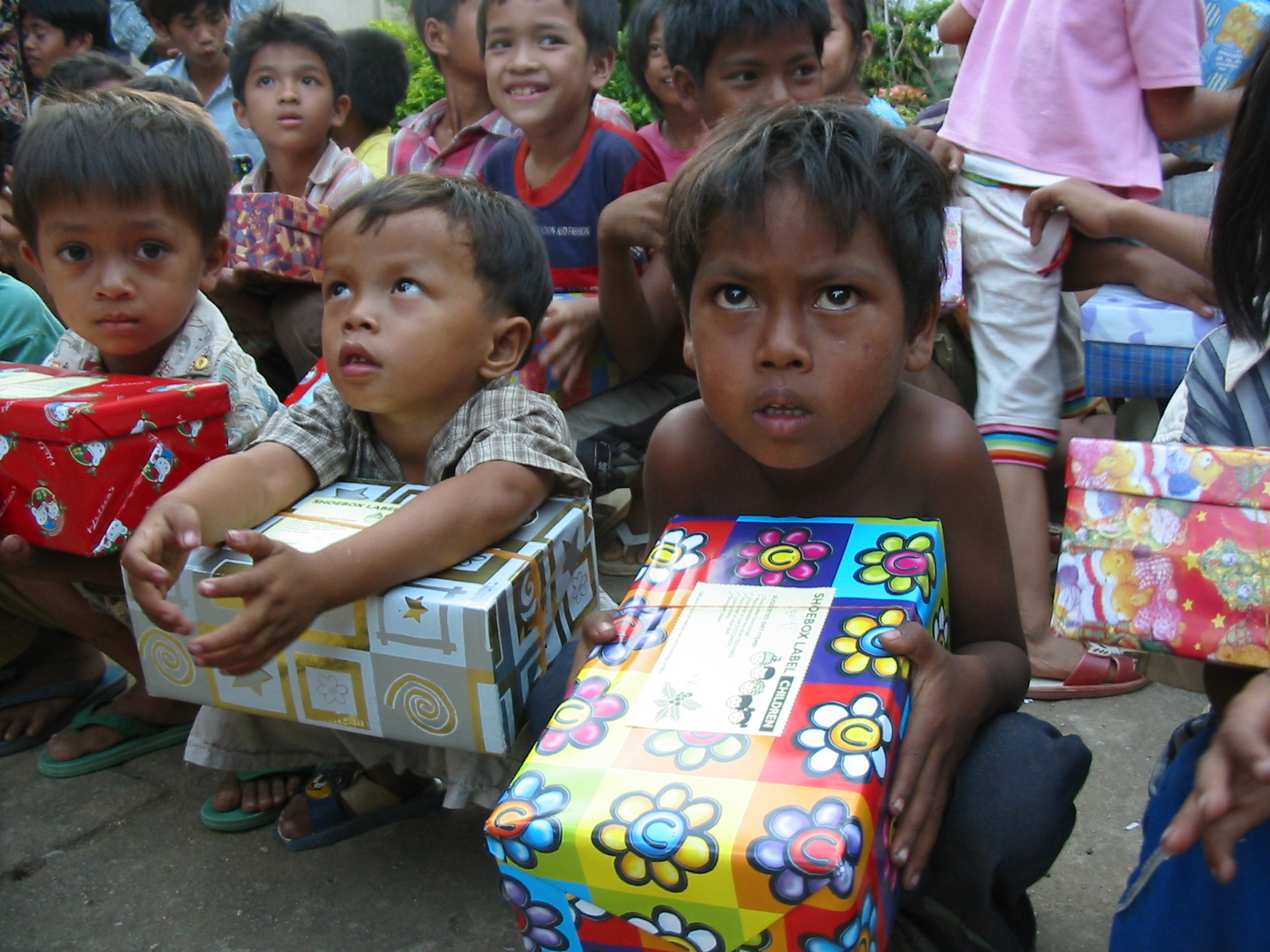
The children receiving presents just in time for Christmas.
In 2007, Elijah and Grace returned to Singapore after spending four years in Cambodia. By then, Elijah was feeling slightly burnt out and hoped to further his studies in Singapore.
“I felt it was time to upskill myself,” he said. “Grace was also pregnant with our first child and we returned home for the delivery.” They now have two teenaged children.
Elijah is now a counsellor with Counselling and Care Centre.
Since their return, they have paid four visits to Cambodia – this time as a family. Before Covid struck, Elijah also returned twice on his own with a number of fathers from the Elijah 7000 movement to speak on marriage, family and fathering.
“I wanted to prepare my children for the possibility of us returning to do missions overseas. Our worldview needs to be larger – beyond Singapore. My life cannot just be limited to my family and church in Singapore,” said Elijah.
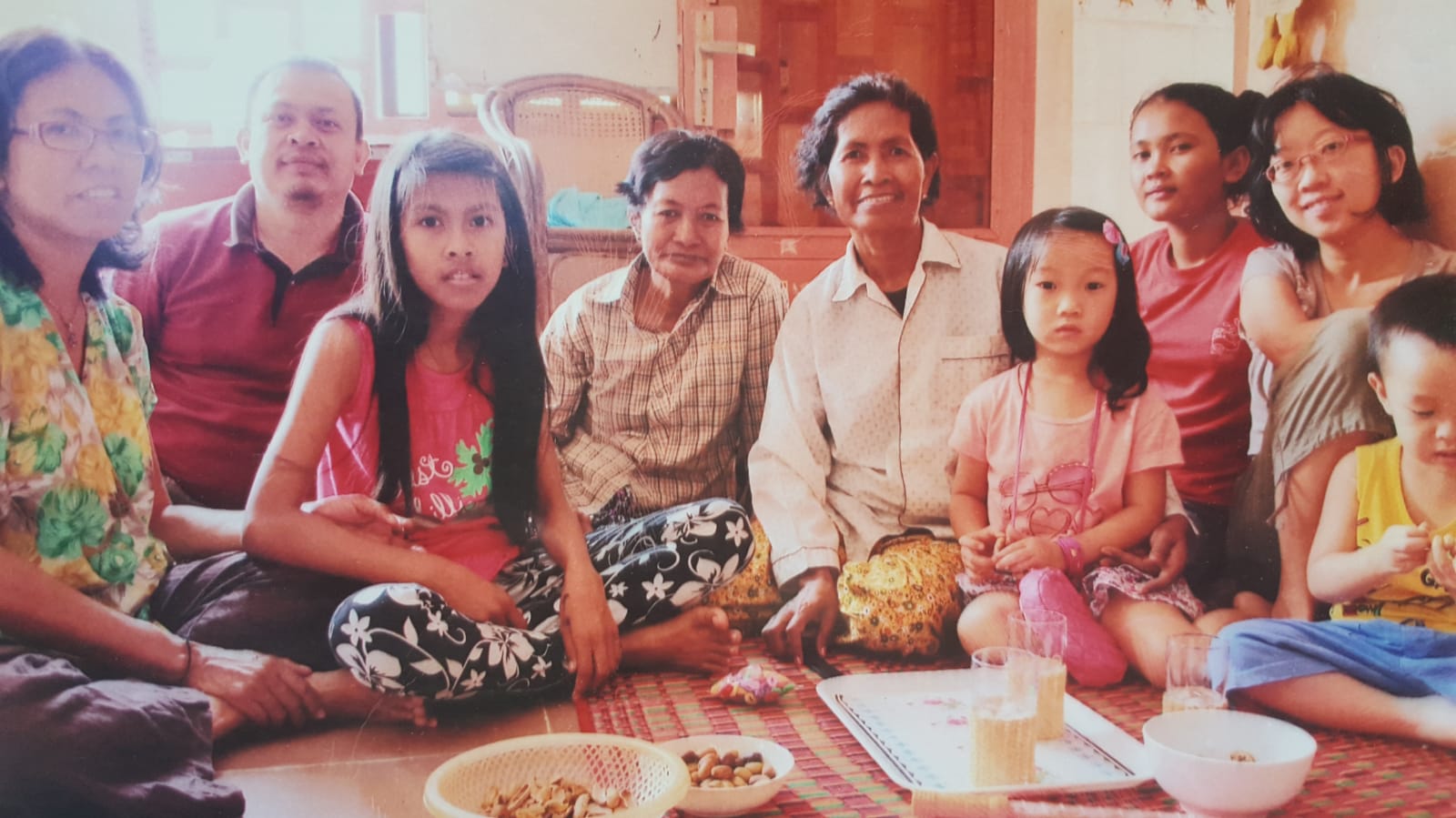
One of the Sim family visits to Cambodia. Grace is on the extreme right. The two youngest children in picture are their daughter and son. On the extreme left is their first MTI Cambodian local staff, Kim Kakada, along with her family members.
“Our God is a God of the nations and a God of the generations. Missions is not just about what I can do in those four years but about what can continue in the generations when we equip the people there to rise up and serve their own people,” he added.
Singaporeans are well-placed for missions, noted Grace.
“We have an advantage because we are able to understand cultural nuances since we are exposed to both Western and Asian influences,” said Grace.
“God uses ordinary people like us, with our little five loaves and two fishes. May more churches and people reach out to the many nations that are at our doorsteps.”
To explore opportunities to serve the poor and marginalised in East Asia through OM, click here.
You can follow OM Singapore on Instagram and Facebook to find out more.
RELATED STORIES:
We are an independent, non-profit organisation that relies on the generosity of our readers, such as yourself, to continue serving the kingdom. Every dollar donated goes directly back into our editorial coverage.
Would you consider partnering with us in our kingdom work by supporting us financially, either as a one-off donation, or a recurring pledge?
Support Salt&Light